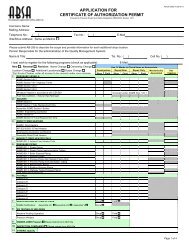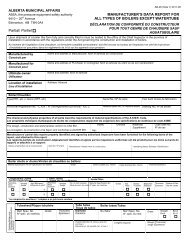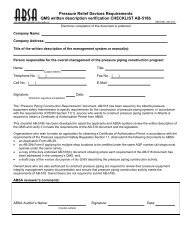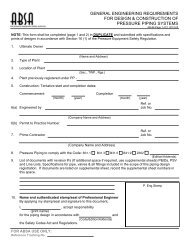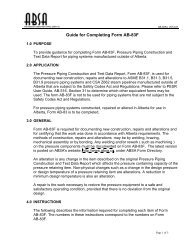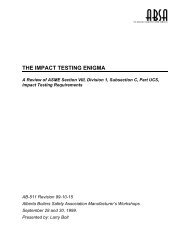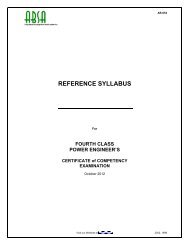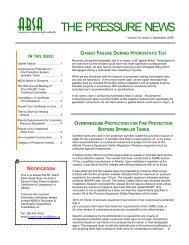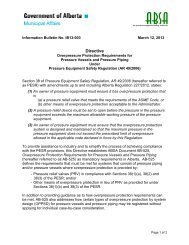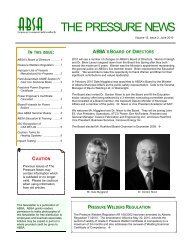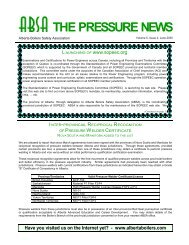The Baker Panel Report - ABSA
The Baker Panel Report - ABSA
The Baker Panel Report - ABSA
Create successful ePaper yourself
Turn your PDF publications into a flip-book with our unique Google optimized e-Paper software.
accountability, unclear roles and responsibilities, and poor communication with employees tending to work within silos.This, in turn, creates a confusion around some of the many interfaces. 35<strong>The</strong> <strong>Panel</strong> observed many instances of this lack of clarity. In the view of the <strong>Panel</strong> and within BP, the respective responsibilities andaccountabilities of, and the inter-relationships among, the Safety and Operations function, the Group Technology function, and the Refiningand Marketing HSSE and Technology organization (all of which are outside the refinery line organization) are not clear. At the refinery level, it isapparent that situations existed in which no one was clearly responsible for work that clearly impacts process safety (for example, thepreparation of management of change analyses), and some refinery workers were uncertain how and where process safety management fitwithin the refinery’s organization. While the BP Management Framework recognizes that accountabilities for process safety performance runwith the line, BP must clarify the responsibilities of those in the line and of staff that supports the line to be successful in fostering goodprocess safety performance.Absence of checks and reviews. At each link in the management chain, a BP manager or supervisor delegates responsibility to a personbelow, and the delegator satisfies his or her ongoing accountability by monitoring the delegatee’s performance. BP’s structure provides very fewindependent checks and reviews with respect to the functionality of this chain. As a practical matter, this framework depends heavily uponhaving healthy, productive relationships between the individuals at each and every link in this chain of command.A problem can occur in this management framework if a breakdown in communication or understanding exists at any one of these interfaces.With respect to process safety, there are many potential reasons for such a breakdown, including the delegatee may not perceive a process hazard, the need to correct a process safety problem, or a process safety cultural weakness,and as a result, the delegator does not learn of the issue; the delegatee may believe that other goals, such as financial, production, or cost-cutting objectives, are more important to thedelegator than process safety goals; and the delegator may not have sufficient understanding of the issues facing the delegatee, whether because of poor communication,lack of substantive knowledge, or otherwise.Even a single dysfunctional relationship in the chain—whether between a supervisor and a superintendent, a refinery plant manager and theregional vice president, or the head of global refining and the Chief Executive, Refining and Marketing—can create a significant break in themanagement system for ensuring process safety performance.Lack of process safety expectations. Under BP’s Management Framework, the refinery plant manager is accountable for all aspects of therefinery’s operations with the exception of those encompassed by the centralized group functions, such as Tax and Accounting. While therefinery plant manager has many direct reports to whom accountabilities may be further delegated, BP regards the refinery plant manager asthe person responsible for the refinery’s financial, operational, environmental, and safety performance. While those in the line above the refineryremain accountable for all aspects of the refinery’s performance, including safety, BP’s management framework is clear that refinery corporatemanagement satisfies its responsibility by monitoring performance, not by supervising the operations of the refineries.BP recognizes that in this organizational framework, the refinery plant manager has a tremendous amount of discretion in running thebusiness. Some people at BP refer to this as an “empowerment ethos.” 36 As Browne has described, “we want them to be entrepreneurs, notbureaucrats doing exactly what they are told from above.” 37On a day-to-day level, the refinery plant manager makes countless decisions relating to or affecting process safety. Particularly in the shortterm,many of these decisions often involve balancing of various other refinery objectives and goals, such as production, profitability, costreduction, and scheduling. While BP provides plant managers with reasonably clear guidance and direction with respect to financial,Corporate Safety Culture C 92



